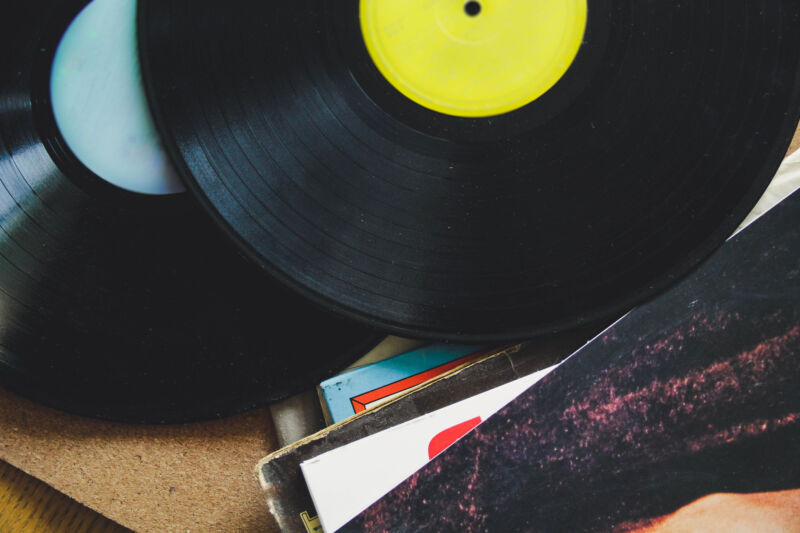Internet Archive’s legal woes mount as record labels sue for $400M

Major record labels are suing the Internet Archive, accusing the nonprofit of “massive” and “blatant” copyright infringement “of works by some of the greatest artists of the Twentieth Century.”
The lawsuit was filed Friday in a US district court in New York by UMG Recordings, Capitol Records, Concord Bicycle Assets, CMGI, Sony Music Entertainment, and Arista Music. It targets the Internet Archive’s “Great 78 Project,” which was launched in 2006.
For the Great 78 Project, the Internet Archive partners with recording engineer George Blood— who is also a defendant in the lawsuit—to digitize sound recordings on 78 revolutions-per-minute (RPM) records. These early sound recordings are typically of poor quality and were made between 1898 and the late 1950s by using very brittle materials. The goal of the Great 78 Project was to preserve these early recordings so they would not be lost as records break and could continue to be studied as originally recorded.
In a blog post responding to the record labels’ lawsuit, Internet Archive founder Brewster Kahle said that the Internet Archive is currently reviewing the challenge and taking it seriously. However, Kahle characterizes the Great 78 Project as providing “free public access to a largely forgotten but culturally important medium,” claiming that “there shouldn’t be conflict here.”
“Through the efforts of dedicated librarians, archivists, and sound engineers, we have preserved hundreds of thousands of recordings that are stored on shellac resin, an obsolete and brittle medium,” Kahle said. “The resulting preserved recordings retain the scratch and pop sounds that are present in the analog artifacts; noise that modern remastering techniques remove.”
Blood declined Ars’ request to comment on pending litigation.
Record labels said that the conflict is obvious. From their perspective, the Great 78 Project undercuts the industry’s profits from selling licenses to stream some of the world’s most popular recordings of all time on services like Spotify or Apple Music.
According to Kahle, listeners accessing those streaming songs are different audiences than those who visit the Great 78 Project to hear how original recordings sounded, though.
“When people want to listen to music, they go to Spotify,” Kahle said. “When people want to study sound recordings as they were originally created, they go to libraries like the Internet Archive. Both are needed.”
Supporting this logic, Kahle noted that the Great 78 Project’s recordings “are used in teaching and research, including by university professors like Jason Luther of Rowan University, whose students use the Great 78 collection as the basis for researching and writing podcasts for use in class assignments.”
However, this “usage is tiny,” Kahle said, confirming that on average, each recording is accessed by only one researcher per month.
Perhaps if the usage was limited to this research, record labels might continue looking the other way. But the record labels are suing over “hundreds of thousands” of popular recordings that have been accessed and downloaded hundreds or even thousands of times on the Great 78 Project’s website. This causes “significant harm” to labels, as well as artists and their heirs, whom the complaint said never “see a dime” from the Internet Archive’s streams and downloads.
The complaint said that rather than paying artists and rights holders, the Internet Archive financially benefits from digitizing popular recordings. Record labels alleged that the Internet Archive advertises the free music hosted by the Great 78 Project on social media, attracting a wider audience to webpages where the Internet Archive requests donations. They argue that the Internet Archive is “willfully” ignoring copyrights to attract more donations by giving away popular songs that the nonprofit has no right to distribute.
Lawyers for record labels did not respond to Ars’ request to comment but wrote in the complaint that the Internet Archive attempts “to defend their wholesale theft of generations of music under the guise of ‘preservation and research,’ but this is a smokescreen: their activities far exceed those limited purposes.”
“Internet Archive unabashedly seeks to provide free and unlimited access to music for everyone, regardless of copyright,” the complaint said.
Record labels have demanded a jury trial and damages that could amount to hundreds of millions of dollars. The complaint identifies more than 2,700 infringing works, estimating that appropriate damages for each recording could amount to $150,000. A loss could cost Internet Archive more than $400 million.
Kahle seems prepared to defend against the charges that the Great 78 Project violates the Copyright Act and the Music Modernization Act—the latter of which was enacted in 2018 to extend copyright protections explicitly for pre-1972 recordings. Because record labels’ lawsuit quickly followed on the heels of a challenge from book publishers who successfully sued the Internet Archive over copyright claims earlier this year, Kahle has questioned the motives of lawyers behind this latest complaint.
“Now the Washington lawyers want to destroy a digital collection of scratchy 78 RPM records, 70 to 120 years old, built by dedicated preservationists in 2006,” Kahle told The New York Times. “Who benefits?”
https://arstechnica.com/?p=1960980